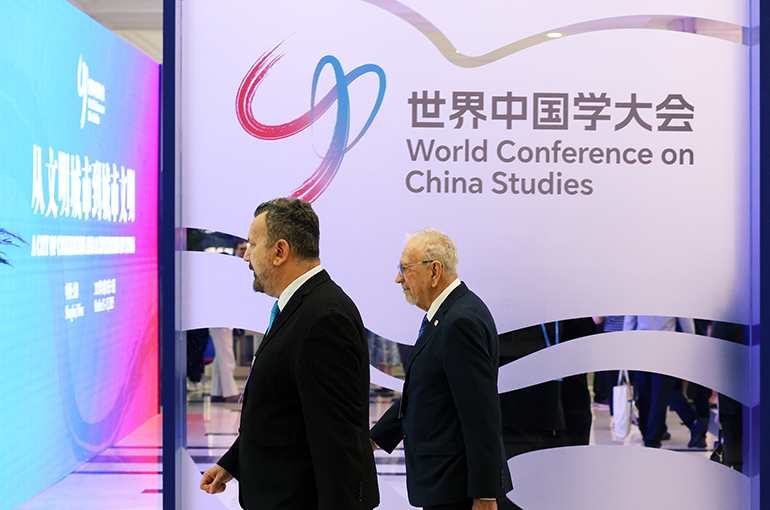 Experts Urge Shift to Studying China’s Dynamic Present, Not Just Its Past
Experts Urge Shift to Studying China’s Dynamic Present, Not Just Its Past(Yicai) Oct. 15 -- The world must turn its focus from a purely historical lens to a deep and direct engagement with China's dynamic present to truly understand the country, according to several international experts in the field.
China Studies must "play a bigger role by focusing more on the dynamic developments in contemporary China and deepening research on Chinese-style modernization," Gao Xiang, president of the Chinese Academy of Social Sciences, said at the second World Conference on China Studies that opened in Shanghai yesterday.
The three-day conference, themed "Historical and Contemporary China: A Global Perspective," aims to achieve a broader consensus on advancing Sinology (the study of the Chinese civilization) and promote ongoing cultural exchanges between China and the rest of the world. Around 500 global experts are attending this year.
According to Gao, China's journey offers a "brand-new choice" for developing nations and can provide "insights into answering the profound question of 'Where is humanity headed?'"
Scholars should move beyond detached observation and embed their work within the "living experience" of modern China, noted Lin Shangli, president of Renmin University of China. "Leaving the Chinese scene, any narrative about the country may become a view from the other side of the river."
Only by embedding research into the triple context of five thousand years of civilization, a super-large-scale society, and socialism with Chinese characteristics, can one create knowledge that can truly understand China, explain the country, and benefit mankind, Lin added.
With most of the world's population residing in the Global South and countries including Chile, Brazil, Nigeria, and Saudi Arabia deepening ties with China via the Belt and Road Initiative, there has been a "decentering of Western influence" in China Studies, said Martin Jacques, a senior visiting fellow at IDEAS, the Asia research centre of the London School of Economics, and a visiting professor at the China Institute of Fudan University.
Because China "is not and will never be Western, it 'always fails the Western test,' fostering negativity," Jacques pointed out, challenging the long-held paradigm of judging the country by Western standards.
Views on how to engage with contemporary China varied between the experts at the conference, reflecting a complex global landscape.
The China-Europe relation is at a critical crossroads, where the core task is not to eliminate competition but to manage it, according to Romano Prodi, former prime minister of Italy and ex-president of the European Commission. "Strategic cooperation" remains the cornerstone of ties, with any form of "decoupling" going against the fundamental interests of both sides, he added.
Thomas Gold, a sociology professor at the University of California, brought the scale of China's recent transformation by recalling his 1980 visit to a rural Pudong district in Shanghai with "no skyscrapers, subway, expressway, maglev, or international airport" and admitting his initial skepticism about the country's development goals.
"I have been very happy to be wrong," Gold said, reflecting on Pudong's status as one of the most modernized places on earth. When China began reforms, it looked to other economies as possible models, but this has changed, with other countries sending their technicians, economists, and engineers to see what they might be able to learn from China, he noted.
The clear message at the conference remains that the study of China is evolving. Scholars are increasingly turning their eyes to the nation's present to comprehend its future trajectory and its growing role in shaping the 21st century.
The World Conference on China Studies is hosted by the State Council Information Office and the Shanghai government, with support from the Ministry of Culture and Tourism, the Chinese Academy of Social Sciences, Renmin University of China, Fudan University, Beijing Foreign Studies University, and Beijing Language and Culture University.
Editor: Martin Kadiev